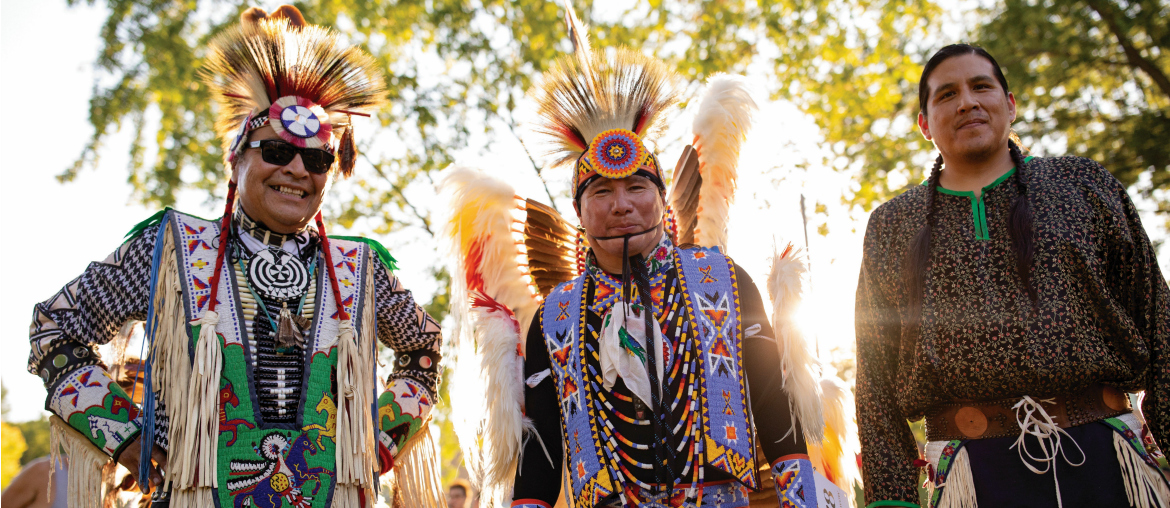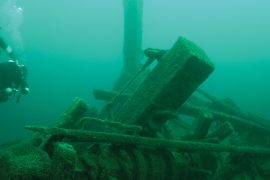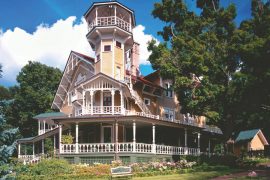Wisconsin is home to the largest concentration of Native American tribes in any state east of the Mississippi—so wherever you wander in Wisconsin, you can find tribes’ cultural museums, powwows, casinos and even the first tribal national park. Their culture is rich and their stories are fascinating—in fact, each of the state’s 11 nations has its own government, language, traditions, customs and history. To learn more about them, visit these cultural hotbeds below.
Bayfield
The Red Cliff Band of Lake Superior Chippewa played a critical role in creating our nation’s first tribal national park (see sidebar). They hold an annual powwow in July and Cultural Days in September. They also operate the Legendary Waters Resort & Casino, which has gorgeous Lake Superior and Apostle Islands views. The casino has a tribe history wall, and the tribe manages a fish hatchery which is open for public tours. redcliff-nsn.gov, legendarywaters.com
Black River Falls
The Ho-Chunk Nation annually sponsors powwows during Memorial Day and Labor Day weekends at the Andrew Blackhawk Memorial Pow Wow Grounds. They also operate six well-known gaming complexes throughout the state. ho-chunknation.com, ho-chunkgaming.com
Crandon
The Forest County Potawatomi Cultural Center, Library and Museum houses 4,000 library books on the history and culture of the Great Lakes Indians. It also hosts language and cultural classes and ceremonies. fcpotawatomi.com/culture-and-history
De Pere
Say “Sakoli” (sa-go-lee, which is Oneida for “hello”) to the Oneida Nation Cultural Tour, which celebrates these people that came to the Green Bay area in 1823. Visitors see a traditional longhouse and 100-plus-year-old log homes originally inhabited on the reservation. More than 100 buffalo can be seen at the Buffalo Overlook. An amphitheater is the setting for musical acts, storytellers, and colorful smoke dancers. Also check out the Oneida Museum, the nation’s apple orchard and the Oneida Market, that sells essential oils, teas and local meats. exploreoneida.com
Danbury
At Forts Folle Avoine Historical Park, costumed interpreters describe daily life of 1800’s-era Ojibwe at two reconstructed fur trading posts and Woodland Indian Village. The trading post was only rediscovered by archeologists in 1969, along with trade beads, axes, gun parts, clay smoking pipes and other artifacts. Competitions and demonstrations are also held year-round, and wild rice pancake breakfasts are hosted on selected Sundays in the summer. theforts.org
Keshena
The Menominee Logging Camp Museum is one of the largest and most complete logging museums in the United States, bringing to life the history of Wisconsin’s first industry. The nearby Menominee Cultural Museum is the focal point of the Menominee tribe’s culture, history and language. Try gaming or see headliner acts at the Menominee Casino Resort, or explore the Northwoods by rafting through the reservation’s sustainable forests along the Wolf River. menominee-nsn.gov, menomineecasinoresort.com
Lac du Flambeau
The Ojibwe are one of three nations of the Anishinaabe, along with the Potawatomi and the Ottawa. The George W. Brown, Jr. Ojibwe Museum & Cultural Center’s exhibits celebrate their culture with arts and crafts, year-round programs and classes, and a gift shop. The nearby Waaswaaganing Indian Bowl Living Arts & Culture Center has been holding powwows in the summers since the 1950s along the shores of Long Interlaken Lake, as well as hosting a Wild Rice Festival powwow in September. The Lake of the Torches Resort Casino (operated by the Lac du Flambeau Band of Lake Superior Chippewa) is nearby. ldfmuseum.com, indianbowlproject.org, lakeofthetorches.com
Madison, Black River Falls, Nekoosa, Tomah, Wisconsin Dells and Wittenberg
Ho-Chunk Gaming Madison is the only Wisconsin casino dedicated to Class II gaming (where players win against other players rather than against the casino). An expansion is being planned. There are five other Ho-Chunk Gaming casinos around the state. ho-chunkgaming.com
Milwaukee/West Allis
The state’s largest Native American cultural event is the Indian Summer Festival in Milwaukee, held at the Summerfest grounds. The annual Winter Powwow is held at Wisconsin State Fair Park in West Allis in March. Also, the ever-popular Potawatomi Hotel & Casino (operated by the Forest County Potawatomi) is right next to downtown Milwaukee and attracts more than six million visitors annually. indiansummer.org/winter-powwow, paysbig.com
Our Nation’s First Tribal National Park
The first tribal national park in the United States was formed from an original parcel of reservation land of the Red Cliff Band of Lake Superior Chippewa. Today, almost 300 acres around Frog Bay near Bayfield are protected from development as the Frog Bay Tribal National Park. The natural features of this park include a boreal forest, coastal estuary and a three-quarter-mile stretch of secluded Lake Superior shoreline. Online maps show rustic mainland hiking trails which give rare glimpses of five of the islands of the Apostle Islands National Lakeshore. The Apostle Islands themselves are rich in history, as the Ojibwe were the original inhabitants, according to their written and oral history. redcliff-nsn.gov/divisions/tnrd/fbtnp.htm
Photo: TravelWisconsin.com
This article originally appeared in the 2019 fall/winter issue of Experience Wisconsin magazine. The contents of this article were checked for accuracy when it was published; however, it’s possible some of the information has changed. We recommend you call first if you have specific questions for the destinations, attractions or restaurants mentioned in this article.
No portion of this article or magazine may be reproduced without prior written permission by the publisher.






Comments are closed.